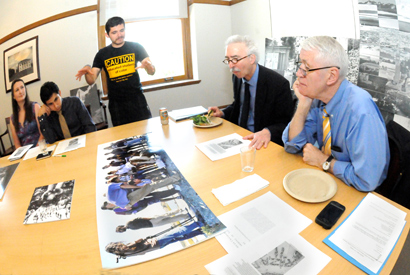Chancellors see Berkeley’s future through students’ eyes
Dirks, who takes over as Berkeley's chancellor on June 1, and Robert Birgeneau, who has held that position for nine years, took a lunch meeting in a Durant Hall conference room with the winners of the campus's Fiat Lux Remix contest.

May 3, 2013

Everto Gutierrez, standing, explains his photographic restaging of an Adams original to Chancellor Birgeneau and Chancellor-designate Dirks. At left are Luis Flores and Elena Kempf, the contest’s two grand-prize winners. (Peg Skorpinski photo)
“It’s very hard to know what language to use to reconstitute a sense of the public good that is in accord with what we’re doing at this institution. In a way you’re all dealing with this,” Nicholas Dirks told a small group of students Thursday. “There’s something special about this place, and we have to be able to communicate that.”
Dirks, who takes over as Berkeley’s chancellor on June 1, and Robert Birgeneau, who has held that position for nine years, took a lunch meeting in a Durant Hall conference room with the winners of the campus’s Fiat Lux Remix contest, in which students, faculty and staff members were invited to revisit Ansel Adams images of UC campuses from the book Fiat Lux, the subject of last fall’s On the Same Page program.
On Thursday, Dirks and Birgeneau heard brief presentations from five of the seven winners of the contest, who showed off their visual handiwork — except, that is, for co-grand prize winner Luis Flores, whose entry was a paper titled “The American University and the Establishment of Neoliberal Hegemony” — and shared their thoughts about Berkeley and, in the spirit of the 1967 book Fiat Lux, commissioned by then-President Clark Kerr, its character as a public institution.
“It seems like you’re facing a time when key institutional habits of this university are in peril, and have been for a few years,” Flores told Dirks, a reference to fiscal struggles facing both the UC system and the Berkeley campus.
Catherine Cole, a professor of theater, dance and performance studies, was the driving force behind the “Fiat Lux Redux” project. She told the incoming and outgoing chancellors how, during tours of a recent Bancroft Museum exhibition of Adams’ photographs, she routinely asked visitors how they responded to people who demanded to know why they should subsidize the university when its students will earn more money after they graduate — a private, not a public, good?
It was not until the final tour, she told them, that one woman answered, “You need a highly educated electorate in order to have a highly functioning democracy.”
That idea — the critical importance to society of the less tangible benefits of a vibrant public-university system — drew a positive response from both Birgeneau and Dirks.
To boost public support during the economic downturn, Birgeneau said, “We’ve focused so much on the economic benefits to our graduates, I think it’s really backfired on us.”
“One of the things that we’ve been called upon to do as senior leaders of universities is constantly to instrumentalize the value of a college education,” added Dirks. “That’s become to a very large extent the way in which the public evaluates the success or failure of institutions of higher education. In a way, by giving in to that, we’ve abdicated what used to be a much more common way of thinking and talking about higher education… We have to find the language to justify the less quantifiable things that we do.”
The language, and also — as shown by most of the contest winners — the pictures.
For a closer look at the winners and their projects, see Contest winners shine new light on Fiat Lux.